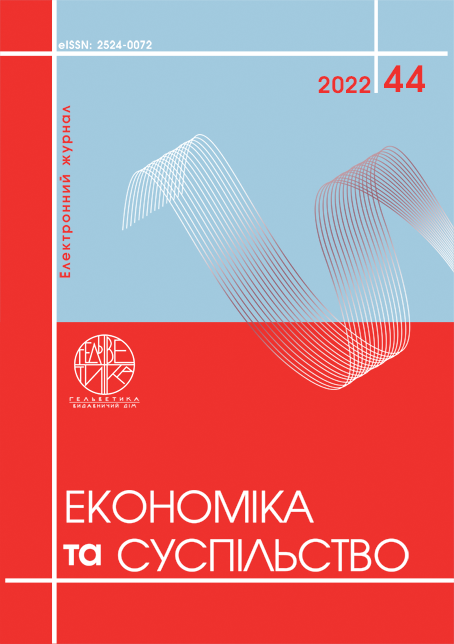ANALYSIS OF MODERN ECONOMIC THEORIES AND EXPERIENCE OF GOVERNMENT REGULATION IN THE WORLD
Abstract
The article proves that economic theory has always played an important role in the formation of state regulation strategies in the leading countries of the world during the last centuries. Constant scientific research in this direction was determined by many factors, in particular: changes in the external and internal environment, technological development and globalization, informatization of all spheres of economic activity and social life, development of economic and mathematical tools for modeling the behavior of complex economic systems, and others. Despite this, until today, humanity has not learned how to prevent global crisis phenomena, which determines the relevance of this study and its practical significance. The generalization of such scientific experience makes it possible to determine not only the socio-economic problems of modern market economies and methods of solving them, but also to propose effective regulatory measures for public administration in Ukraine. Leading scientists in their works devote a lot of attention to the practical aspects of state regulation in Ukraine, from the standpoint of one theory or another. It was found that, in contrast to the new Keynesianism, neoliberalism, as before, denied the need for strict state regulation in the sphere that is directly related to economic activity. Instead, the state should create conditions for the free competitive development of the market economy. Based on the results of the analysis, it was concluded that modern institutionalism at the beginning of the 21st century. continues intensive development in the evolutionary and sociological direction. His scientific developments, in most cases, are theoretical in nature and have a limited scope of application in solving practical tasks of public administration. The scientific novelty of this work is the research and analysis of the theoretical foundations of modern economic theories based on the generalization of world experience, which, unlike the existing ones, results from the need for a mixed approach to justify measures of the regulatory policy of the national economy.
References
Стюарт И. Панорама экономической мысли конца ХХ столетия: В 2 т. / Под ред. Д. Гринэуэя, М. Блини, И. Стюарта. СПб.: Экономическая школа, 2002. 787 с.
Уэбстер Ф. Теории информационного общества. Москва : Аспект Пресс, 2004. 400 с.
Фещенко В. М. Сучасні економічні теорії: навч. посіб. Київ : КНЕУ, 2012. 474 с.
Рихтер Р., Фуруботн Э. Институты и экономическая теория. Достижения новой институциональной экономической теории. СПб.: Издат. дом С.-Петерб. гос. ун-та. 2005. 702 с.
Гальчинський А. Лібералізм. Уроки для України. Київ : Либідь, 2011. 288 с.
Геєць В. Ліберально-демократичні засади: курс на модернізацію України. Економіка України. 2010. № 3. С. 4–20.
Пинзеник В. М. Коні не винні: Реформи чи їх імітація. Київ : Видавничий центр "Академія", 1999. 128 с.
Shmygol, N., Marhasova, V., Galtsova, O., Solovyov, O., Zhavoronok, A. (2020). Problems of competitive development of industry in Ukraine. European Journal of Accounting, Finance & Business, 14 (24).
Норт Д. Інституції, інституційна зміна та функціонування економіки / Д. Норт; пер. І. Дзюб. Київ : Основи, 2000. 198 с.
Девидсон П. Посткейнсианская школа в макроэкономической теории. Вопросы экономики. 2006. № 8. С. 82–101.
Фридмен М. Основы монетаризма / Под науч. ред. Д. А. Козлова. Москва : ТЕИС, 2002. 175 с.
Бьюкенен Дж. Нобелевские лауреаты по экономике. Т. 1 / Фонд экономической инициативы. Москва : Таурус Альфа, 1997. 560 с.
Stuart I. (2002) Panorama of economic thought of the end of the XX century: In 2 volumes / Ed. D. Greenaway, M. Blyna, I. Stewart. St. Petersburg: Economic School, 787 p.
Webster F. (2004) Theories of information society, M. Aspect Press, 400 p.
Feshchenko V.M. (2012) Modern economic theories: teaching. manual. Kyiv: KNEU, 474 p.
Richter R. (2005) Institutes and economic theory. Achievements of the new institutional economic theory / R. Richter, E. Furubotn. St. Petersburg: Izdat. St. Petersburg house Mr. Univ. 702 p.
Galchynskyi A. (2011) Liberalism. Lessons for Ukraine, K. Lybid, 288 p.
Geets V. (2010) Liberal-democratic principles: a course for the modernization of Ukraine. Economy of Ukraine. No. 3. P. 4–20.
Pynzenyk V. M. (1999) Horses are not to blame: Reforms or their imitation. Kyiv: Publishing center "Aka¬demiya", 128 p.
Shmygol, N., Marhasova, V., Galtsova, O., Solovyov, O., Zhavoronok, A. (2020). Problems of competitive development of industry in Ukraine. European Journal of Accounting, Finance & Business, 14 (24).
North D. (2000) Institutions, institutional change and functioning of the economy / D. North; trans. I. Dzyub. Kyiv: Osnovy, 198 p.
Davidson P. (2006) Post-Keynesian School in Macroeconomic Theory. Voprosy ekonomiki. No. 8. P. 82–101.
Friedman M. (2002) Fundamentals of monetarism / Pod nauch. ed. D. A. Kozlov. Moscow: TEIS, 175 p.
Buchanan J. (1997) Nobel laureates in economics. Fund of economic initiative. Volume 1. Moscow: Taurus Alpha, 560 p.


